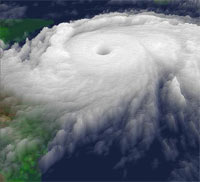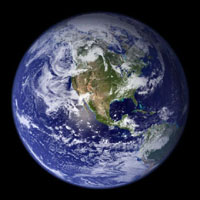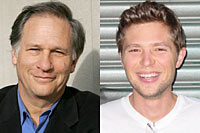
On this page, you'll find regularly updated audio, video, and text reports from our producers and correspondents. We invite you to join the discussion about topics covered here on our board and to subscribe to our audio and video podcasts to download these reports to your computer or MP3 player.

For the first time in recorded history, there were four named storms by early July this year, as well as the earliest category 4 storm ever recorded. 
Is global warming the cause of stronger hurricanes? |
8.11.2005 Global StormingIn the midst of the tropical storm season and on the heels of a recent climatology study published in the journal Nature, Robert Krulwich and Jonah Lehrer got to talking about hurricanes. Robert Krulwich: Ah, the joys of late summer. Corn on the cob, barbeques on the beach, languid evenings spent watching the sun slowly set with a glass of white wine in hand... Jonah Lehrer: Where have you been? This summer has been scorching. If it weren't for my old air conditioner, I don't know how I would survive. Sure, the corn is good, but I'm pretty eager for autumn temperatures. Krulwich: Such a complainer. Lehrer: Who me? I'm not the only one who doesn't like the end of summer. Remember, it's also the start of hurricane season, and some experts are saying that this year is going to be the worst year ever. Krulwich: Ever? Lehrer: Well, at least since they've been keeping track of storms. Krulwich: Why? It seems like last year was a bad year. What are the odds of getting two bad years back to back? Lehrer: The odds are actually pretty good. You see, hurricanes come in cycles. About every 25 years, we go from having lots of hurricanes to having only a few hurricanes. Krulwich: And then? Lehrer: And then after 25 years of not-so-many, it switches to many-too-many. Krulwich: Kinda like the fashion for bell-bottoms. And I take it that right now we are in a lots-of-hurricanes cycle? Lehrer: That's what the meteorologists say, but this cycle seems especially bad. Krulwich: And I bet I know why: it's gotta be global warming. Lehrer: Well, as it happens— Krulwich: But, wait. Didn't I read somewhere that global warming does not cause an increased number of hurricanes? Lehrer: I was just about to say if you'd let me. Yes, you're right. Global warming doesn't cause a greater number of hurricanes, according to a paper published in Nature last week. Global warming does seem to have caused worse hurricanes. Krulwich: Worse as in "badder?" Lehrer: Exactly. Bigger, deadlier hurricanes with stronger winds and more rain. Krulwich: Why? Lehrer: Because warmer oceans produce more intense hurricanes. Krulwich: But are the oceans getting warmer? Lehrer: Yes, 'cause— Krulwich: —cause I'm just wondering: The Earth is getting warmer, that's an indisputable fact, which is causing glaciers to melt, another indisputable fact. Now, wouldn't all those melting glaciers actually cool the ocean down? The way I imagine it, it would be like putting an ice cube in a glass of water. Lehrer: You're forgetting one thing. The oceans of the Earth are enormous. Glaciers are big, but they can't be expected to cool all that saltwater. To modify your metaphor, it's actually like putting an ice cube in an Olympic-sized swimming pool. Krulwich: So perhaps my metaphor was a bit off. But I still don't understand how global warming leads to deadlier hurricanes. Spell it out for me. Lehrer: It's actually a two-stage process. Warmer air, which is caused by global warming, leads directly to warmer surface temperatures in the ocean. And when the surface temperatures of the ocean get warmer, hurricanes get worse. More water evaporates, and the swirling storms contain more energy. Krulwich: Now that you mention it, the ocean is more swimmable this year. It's actually lovely. Lehrer: That may be, but for those living in hurricane-prone regions, the warmer temperatures in the Atlantic Ocean in general and the Caribbean basin in particular come as bad, bad news. For example, this year marked the first time on record that the Atlantic spawned four named storms by early July. This year also saw the earliest category 4 storm ever. Krulwich: But come on. We're talking about the weather here. A butterfly flaps its wings in Tokyo and we get a hurricane in Florida. Weather is chaos. My local TV stations can't even predict when a thunderstorm is going to arrive, or whether tomorrow will be 85 or 90 degrees. So how can a single measurement—like ocean temperature—predict the strength of hurricanes? Lehrer: Not all scientists think it can. In fact, some scientists don't even think hurricanes are getting deadlier. The most active hurricane season on record is still 1933, which was back when we thought the world was getting colder. The conventional model of hurricanes doesn't see global warming having an impact on hurricane strength or density until the 2050s. Krulwich: So why is this scientist—what's his name by the way? Lehrer: His name is Kerry Emanuel, of MIT. Krulwich: Why is he convinced things are getting nastier? Lehrer: Well, rather than just rely on mathematical predictions of the future, which when it comes to the weather are notoriously unreliable, Emanuel has gone back to the past. He has collected data on storms from as far back as the 1850s. And while some scientists dispute his statistical methods, his general conclusion is that storm power has increased by 50 percent since the 1970s. Krulwich: Fifty percent! Lehrer: Yup. Krulwich: What does that mean? Fifty percent stronger winds? Fifty percent more rain? Fifty percent what? Lehrer: According to Dr. Emanuel, roughly half the increase he observed in his hurricane statistics is because storms have been lasting longer, and half because their peak wind speeds have been increasing. So to answer your question, storms are just getting 50 percent worse, in every way. This could be the first tangible consequence for the American public of global warming.
Krulwich: You sure know how to spoil a late summer evening. To download a PDF of Kerry Emanuel's August 5, 2005 paper on hurricanes and global warming in the journal Nature, visit wind.mit.edu/~emanuel/cvweb/cvweb.html |
|||||||||||

Robert Krulwich is host and executive editor of NOVA scienceNOW. Jonah Lehrer is a NOVA scienceNOW online contributing editor. He recently completed a Rhodes scholarship at Oxford University's Wolfson College. |
||||||||||||
|
© | Created August 2005 |
||||||||||||